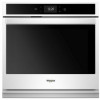Whirlpool WOS72EC0HW Owners Manual - Page 11
Broiling, Convection Cooking
 |
View all Whirlpool WOS72EC0HW manuals
Add to My Manuals
Save this manual to your list of manuals |
Page 11 highlights
Broiling When broiling, no preheating is necessary unless recommended otherwise in the recipe. Position food on grid in a broiler pan, and then place it in the center of the oven rack. Close the oven door to ensure proper broiling temperature. NOTE: Odors and smoke are normal the first few times the oven is used or if the oven is heavily soiled. Changing the temperature when broiling allows more precise control when cooking. The lower the broil setting, the slower the cooking. Thicker cuts and unevenly shaped pieces of meat, fish and poultry may cook better at lower broil settings. Place the food in the upper or lower oven. Refer to the "Positioning Racks and Bakeware" section for more information. On lower settings, the broil element will cycle on and off to maintain the proper temperature. ■■ For best results, use a broiler pan and grid. It is designed to drain juices and help avoid spatter and smoke. If you would like to purchase a broiler pan, one may be ordered. Please refer to the "Accessories" section for more information. Convection Cooking In a convection oven, the fan-circulated hot air continually distributes heat more evenly than the natural movement of air in a standard thermal oven. This movement of hot air helps maintain a consistent temperature throughout the oven, cooking foods more evenly, crisping surfaces while sealing in moisture and yielding crustier breads. During convection cooking, the bake, broil and convection (true convection only) elements cycle on and off in intervals to maintain the oven temperature, while the fan circulates the hot air. If the oven door is opened during convection cooking, the fan will turn off immediately. It will come back on when the oven door is closed. NOTE: The oven door must be closed for convection broiling. Position the racks according to the "Positioning Racks and Bakeware" section before starting convection cooking. With convection cooking, most foods can be cooked at a lower temperature for a shorter length of time. These adjustments can be made using the following chart. Setting Convect Bake Convect Roast Convect Broil Guidelines Reduce the standard baking temperature 25°F (15°C). Use standard recipe temperature. Cooking time may be reduced by 15% to 30% with Convect Roast so the food should be checked for doneness early. Use standard recipe temperature. Cooking time may be reduced so the food should be checked for doneness early. Convert Time/Temp Convection temperatures and times differ from those of standard cooking. The Convert Time/Temp convection feature is a function that converts a standard thermal bake or roast cook time and temperature into an ideal cook time and temperature for convection cooking. The displayed time and temperature will be the converted for convection values. 11















